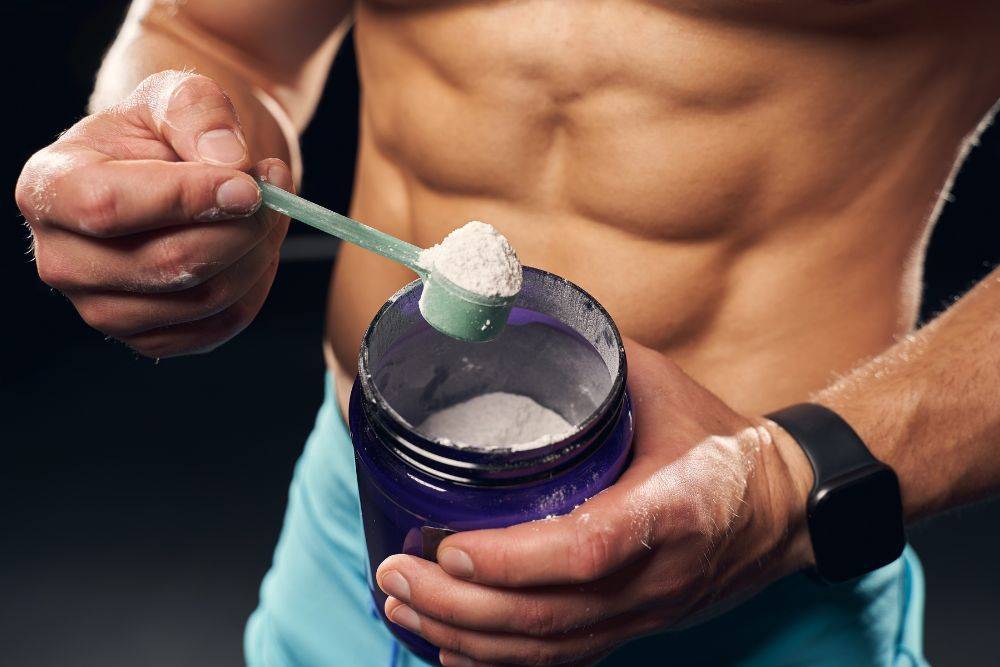When it comes to achieving optimal workout gains, protein is a crucial component of your diet.
Not only does it help build and repair muscle tissue, but it also supports various bodily functions essential for overall health. With so many protein sources available, it’s important to know which types are best for your fitness goals. Here’s a comprehensive guide on the different types of protein to consume for maximum workout gains.
1. Whey
Benefits:
- Fast Absorption: Whey can be quickly absorbed by the body, making it ideal for post-workout recovery.
- Rich in BCAAs: It contains high levels of branched-chain amino acids (BCAAs), which are vital for muscle repair and growth.
- Complete Protein: Whey is a complete protein, meaning it contains all nine essential amino acids.
Natural Sources:
- Milk
- Cheese
- Yogurt
Ideal For: Post-workout recovery and muscle building.
2. Casein
Benefits:
- Slow Digestion: Casein is digested more slowly than whey, providing a steady release of amino acids over several hours.
- Anti-Catabolic: Its slow release helps prevent muscle breakdown, making it perfect for nighttime consumption.
Natural Sources:
- Milk
- Cheese
- Cottage cheese
Ideal For: Pre-bedtime snack to support overnight muscle recovery.
3. Soy-Based
Benefits:
- Plant-Based: Soy protein is a great option for vegetarians and vegans.
- Complete Protein: Like whey, soy protein contains all essential amino acids.
- Rich in Nutrients: Soy protein also provides other nutrients such as fiber, vitamins, and minerals.
Natural Sources:
- Tofu
- Tempeh
- Edamame
- Soy milk
Ideal For: Those seeking a plant-based alternative.
4. Pea-Based
Benefits:
- Hypoallergenic: Pea protein is free from common allergens such as dairy, soy, and gluten.
- High in BCAAs: It contains a good amount of BCAAs to support muscle growth and recovery.
- Digestibility: Easy on the stomach and well-digested by most people.
Natural Sources:
- Split peas
- Green peas
Ideal For: Individuals with allergies or sensitivities to other sources.
5. Egg White
Benefits:
- Complete Protein: Egg white protein contains all essential amino acids.
- Fat-Free: It is low in fat and carbohydrates, making it a lean source of protein.
- High Biological Value: Egg white protein has a high biological value, meaning it is efficiently used by the body.
Natural Sources:
- Eggs (particularly egg whites)
Ideal For: Lean muscle building and those looking to reduce fat intake.
6. Hemp-Based
Benefits:
- Rich in Omega-3s: Hemp protein is high in healthy omega-3 fatty acids.
- Digestible: Easily digestible and contains fiber, which is beneficial for digestion.
- Vitamins and Minerals: Provides essential vitamins and minerals along with protein.
Natural Sources:
- Hemp seeds
- Hemp oil
Ideal For: Vegans and those looking to boost their intake of healthy fats.
7. Brown Rice-Based
Benefits:
- Allergen-Free: Suitable for those with food allergies or intolerances.
- Digestibility: Gentle on the digestive system.
- Plant-Based: A good source of protein for vegetarians and vegans.
Natural Sources:
- Brown rice
Ideal For: Those looking for an easily digestible plant-based protein.
Combining Protein Sources
For optimal workout gains, consider combining different protein sources to ensure you’re getting a full spectrum of amino acids and other nutrients. For example, mixing whey and casein can provide both immediate and sustained protein release. Combining plant-based proteins like pea and brown rice can create a complete amino acid profile similar to that found in animal-based proteins.
Additional Benefits and Considerations
In addition to muscle building and repair, adequate intake supports various other bodily functions such as hormone production, immune response, and enzyme activity. It’s important to consume a balanced diet that includes a mix of different types to cover all these bases. Furthermore, consider the timing of your intake; consuming sources shortly after a workout can significantly enhance muscle recovery and growth.
When choosing your sources, it’s also crucial to consider their overall nutritional content. Whole foods like lean meats, dairy, legumes, and seeds not only provide essential amino acids but also deliver vital vitamins, minerals, and other nutrients that contribute to overall health and well-being. Supplements can be convenient, but they should complement, not replace, a well-rounded diet.
Conclusion
Selecting the right source is essential for maximising your workout gains. Whether you prefer animal-based or plant-based proteins, there are plenty of options to suit your dietary needs and preferences. By incorporating a variety of protein sources into your diet, you can ensure that your body has the necessary building blocks to recover and grow stronger after each workout.
Have a pressing question for a doctor? Medical Channel Asia has launched a community forum page where you can get questions answered by a medical specialist. Visit the community forum here.

